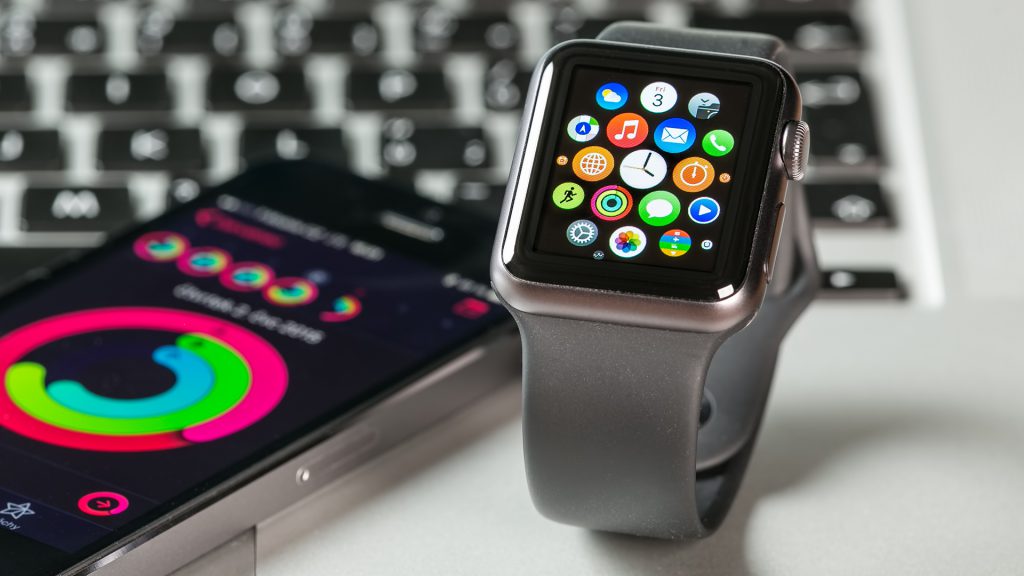Which was the recent Android application that you enjoyed using?
Instagram, Facebook, WhatsApp, and others are a few popular apps people use regularly and enjoy their access. However, apart from its seamless UI/UX, something more appealing and exciting makes them unique.

Now, what’s that?
Well, the application framework makes these applications more valuable and efficient for people. Besides, when it comes to smartphones, a majority of people prefer an android app over iOS apps.
Android operating systems own an 87% global market share, while iOS enjoys the remaining market. This market insight compels you to invest in Android app development and search for a reliable Android app development service that can meet your needs.
So, if you are an entrepreneur planning to invest in Android app development, searching for Android app development services should be included in your checklist.
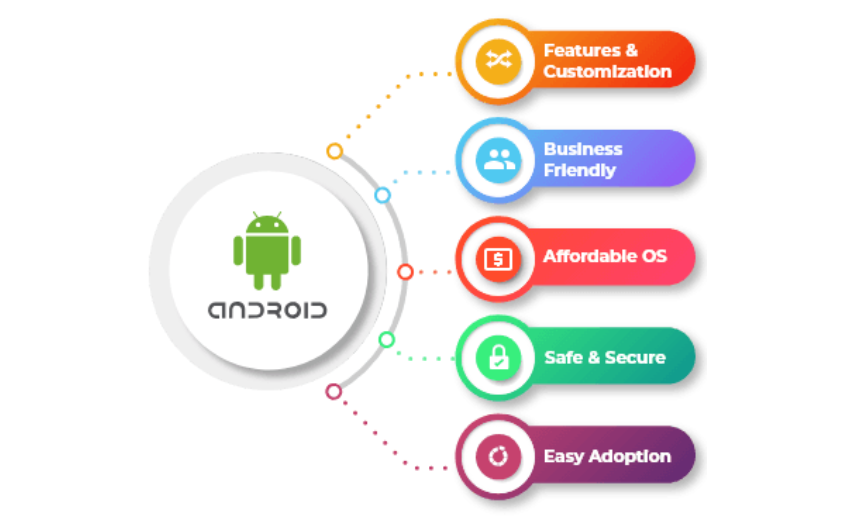
But, before you step into the intricacies of hiring any Android app development, it is essential to gauge some understanding of the Android app development process. This will ensure that you hire Android app development services that can anticipate your business needs and develop a functional Android app.
Here’s what you must know before you begin your Android app development journey:
- Understanding Android App Framework
- Popular Android App Development Frameworks
Understanding Android App Framework
Our Android app developers have made it easy to understand the framework of an Android app. They say an Android app framework is a precise tool that offers essential components, pre-made templates, and structure for Android app development.
Android app framework concentrates on different types of architectures, such as:
- Hybrid applications (These multi-platform apps are written on JavaScript, HTML5, and CSS)
- Native applications (Android and iOS)
- Web application (Quick access through web browsers)
The Android app framework comprises a customizable interface and component structure that enables the Android app code and design to reuse. Android app developers agree that with this framework, you can centralize the base code to one location.
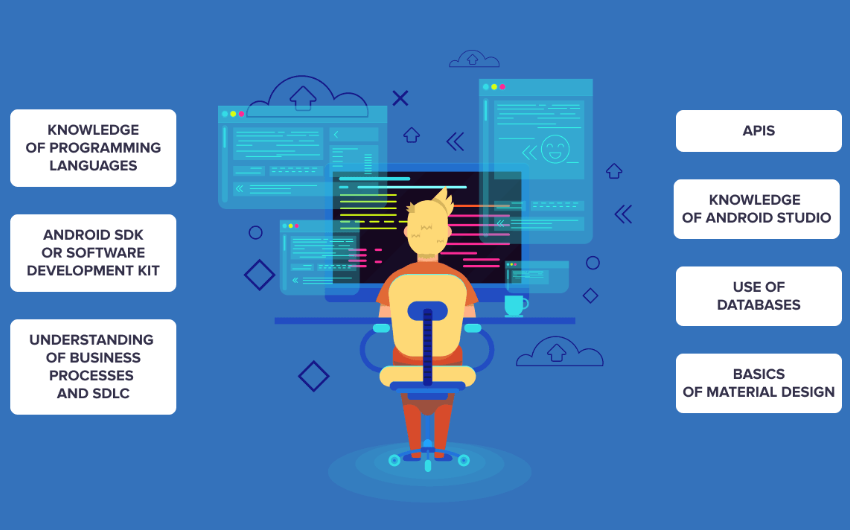
Our Android app developers believe that such an Android app framework allows programmers to craft the app structure and write the code quickly.
The vast popularity of Android app development has resulted in the creation of different Android app frameworks to accelerate and standardize Android app development services and their deliverability.
For such instances, Android app developers propose using popular frameworks such as Xamarin Framework, Ionic Framework, NativeScript Framework, Framework7, React Native Framework, and others.
Popular Android App Development Frameworks
Our experienced Android app developers prioritize selecting these Android app frameworks as they help optimize the right tools and develop elite Android apps.
Brainvire’s Android app developers have shared insights on a few leading frameworks for your better understanding:
The final choice o the Android app development framework depends on your chosen tools. Hence, as an Android app development company, along with tools, we consider each project’s requirements and primary goals to select the framework.
Let’s dive into the pool of Android app development frameworks and explore their insights!
Flutter Framework
This is distinct from other Android frameworks; Flutter is a multi-platform SDK to build Android apps. Developed and maintained by Google, Dart simplifies cross-platform development and is written in Dart language.
Flutter is the best framework for hybrid app development when selecting a framework. Google’s Flutter Android framework uses a 2D rendering engine called Skia to produce visuals that resemble both material design and the Cupertino style of computing.
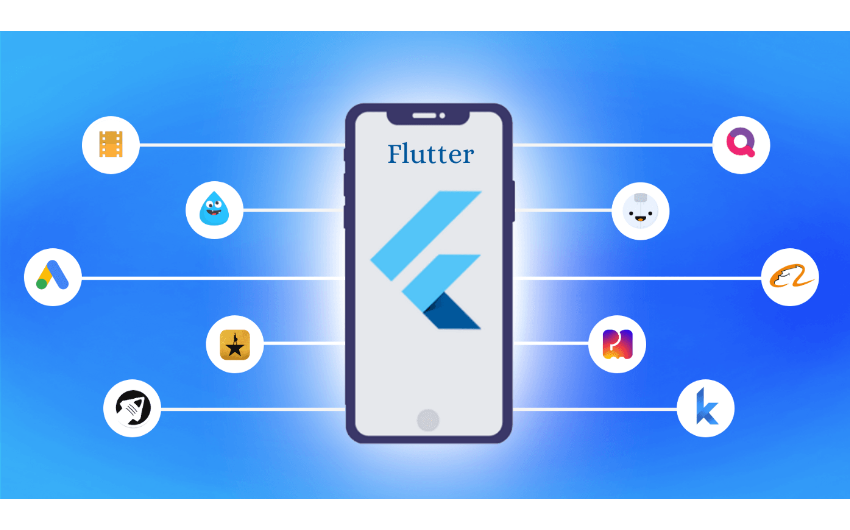
With Flutter, Android app developers can test the apps’ functionality and design using UI and unit tests. When it comes to testing, as an Android app development company, we can say that Flutter is the best at hot reloading because it doesn’t necessitate any restarts.
Flutter Android Framework’s Striking Features:
- Large widget library
- Single codebase
- Reduced code development time
- Amplified time-to-market speed
- Allows quick sharing of codes across platforms
- The use of its rendering engine quickens rendering onto a platform-specific canvas
The framework has the potential to grow into a full-blown cross-platform tool for iOS, Android, Windows, Web browser, Linux, macOS, and other platforms.
Most people who use the Flutter Android framework are aspiring hybrid app developers. Thus, major corporations like Google, Alibaba, eBay, and others now use it to launch their mobile applications built on the Android framework.
Ionic Framework
An open-source and free Android framework certified by MIT (Massachusetts Institute of Technology) allows developers to build progressive hybrid Android apps using HTML5, CSS3, and JavaScript.
Due to its cross-platform capabilities and the skill to integrate AngularJS, the Ionic framework has become the most well-known framework for Android development. The CLI (Command Line Interface) of this Android framework is simple and allows for features like emulators, live reloading, and logging.
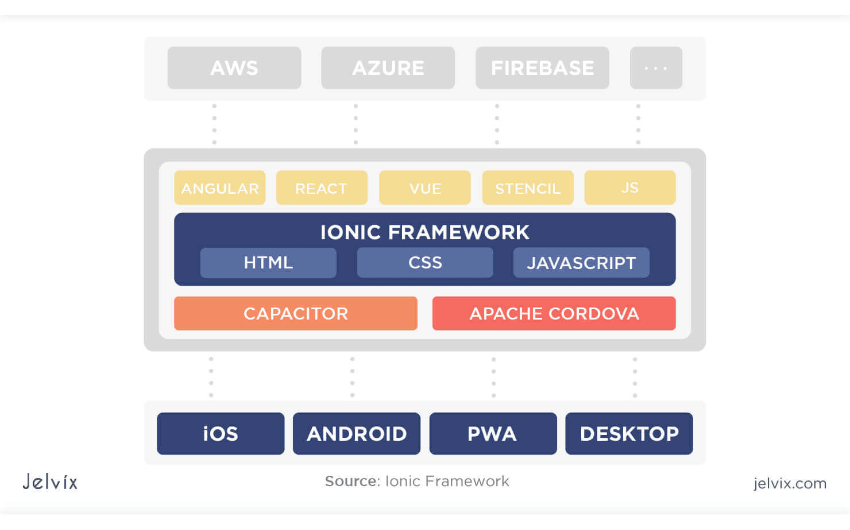
There is a large community around Ionic because of its use of Angular and Cordova. Over 5 million developers in more than 200 countries worldwide have used Ionic to create around 4 million Android apps.
In addition, it is compatible with several services, including Instagram and Google Play.
Ionic Framework Features for Android Mobile App Development:
- Enjoy a native experience with the default user interface
- Cross-platform mobile app development
- JavaScript elements
- Cordova plugins
- Launched under MIT license
- Compatibility with most front-end frameworks, including Angular, the latest JavaScript, and many others, such as React.js and Vue
Developers are the primary target audience for this application. Different startups and web Android development services can now use the Ionic Android framework to launch mobile, desktop, and web applications for rapidly growing companies and agencies from the pharmacy, health race, and insurance industries to hospitality IT and many other scopes.
React Native Framework
React Native, a robust open-source framework backed by Facebook, provides extensive support for many development tools and IDEs. React is a JS library for building web applications. The framework is used by many Fortune 500 companies, including Instagram, Walmart, Airbnb, Tesla, and many more.
It is easier for developers to save time and money by writing code once and running it across multiple platforms with the React Native APIs. This is because react native application development services uses the same basic building blocks found in most Android frameworks.
React Native’s hot-reload feature allows developers to link updated files while keeping the app’s current state. As a result, React Native’s developer community has grown, exceeding Facebook’s expectations.
A look at Google Trends shows that Android has steadily increased in popularity over the last few years. Nearly two thousand programmers have already used the Native framework as of this writing.
Features Of Native Android App Development:
- A single interface is used to create both the app design and development
- Code Push feature notifies app updates quickly
- Supports third-party plugins
- Hot reloading quickened bug fixes and built new features
- Use a declarative programming approach to spot and eliminate bugs quickly
This tool is ideal for quickly and easily launching customized apps. Several world’s largest companies, including Tesla, Meta, Bloomberg, Uber, and Walmart have already partnered with it to launch thousands of apps.
Framework7
As one of the most effective MIT-licensed open-source Android frameworks, Framework 7 comes with various useful features for quick yet convenient app launches. Framework 7 is nearly the newest framework for Android mobile app development
It includes most of the primary and additional Mobile UI features that can be quickly implemented across various projects. Infinite scroll, Lazy loading, Pull to Refresh, Swiper Slider, and more are some great features that Android application developers enjoy.
Most Android application developers recommend Framework7 (Progressive Web App) for creating a PWA. Using HTML, CSS, and JavaScript instead of Android’s standard languages like Kotlin, XML, and Java, it’s simple to integrate with Cordova.
In addition, as a leading app development company, we believe this Android framework has a simple, user-friendly interface, a large user base, and regular updates, which are essential for ensuring a stable, non-disruptive workflow.
Framework7’s Features For Android Devices:
- Easy-to-use and custom Android app development
- Ready to use UI elements
- Useful plugins
- Built-in helped libraries
- Load templates using Router API
According to Android application developers, you should use this framework if you have already worked with HTML and CSS and if you have some knowledge of JavaScript.
The focus of Framework7 is still on the iOS and Google Material concepts to deliver simple yet feature-rich app solutions for mobile Android devices.
Corona SDK
Apps and games can be built quickly using the Corona SDK, developed in 2009. Compared to other Android frameworks, this general-purpose, cross-platform framework can enable 10x faster development time.
Lua, a lightweight programming language with multiple paradigms built on top of C++/OpenGL, is integrated into Corona to make it faster, easier to use, and more flexible. Corona is a popular choice for game developers because it is free and runs on both Mac OS X and Windows.
More than 500 APIs and an advertising platform built for developers are also included in this Android framework.
we know with this framework, a wide range of tools and features can be included in the API, including support for graphics, networking, widgets, and particle effects.
Android app developers love Corona SDK because it is easy to use and integrate into their apps. In addition, since the Android framework is known as Solar2D – an engine for mobile, desktop, and TV apps – this is cross-platform.
Corona SDK Framework Features For An Android Platform:
- Getting started is a breeze
- There are more than a thousand built-in APIs and plugins in the library
- Platform agnostic development that can be applied to other systems
- Access to any native library, such as C/C++/OBJ-C/Java/Obj-C
- Developers can save time with the use of real-time device testing
Plugins allow you to connect to specific platforms on demand because it does not provide an integrated development environment (IDE).
Android’s framework is well-known among game developers as a powerful tool for building apps with various uses on the Android operating system.
Warcraft, Angry Birds, The Lost City, Hopko, and Civilization are just a few notable titles that have already used the Corona SDK.
jQuery Mobile Framework For An Android Platform
jQuery Mobile is a popular cross-platform framework for developing mobile and web applications, and it’s also known as the easiest to use.
jQuery Mobile is well recognized for allowing users to “write code once” and execute it across multiple platforms, including Android, iOS, Windows, Symbian, and Blackberry.
One of the striking features of the Android framework is that it allows for creating basic app interfaces entirely in HTML, with no or very little use of JavaScript code!
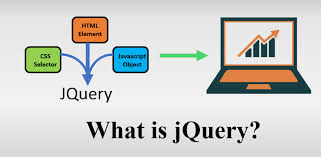
One of the common tools used for traversing and manipulating the HTML DOM tree is also available. CSS animation and Ajax can be made much simpler with the framework of jQuery Mobile Android.
It possesses a built-in theme system that enables developers to tailor the application’s look and feel to the customized needs of each project. Mobile jQuery is one of the most popular Android frameworks because of its small size (about 40KB when minified), making it a popular choice among developers.
jQuery Framework Features For An Android Platform:
- Pop-Ups, Image Slider, and Content Slider are just a few of the many included features
- Compatible with other mobile frameworks for iOS, Windows, and Android
- Easy drag-and-drop functionality with ThemeRoller feature
- JavaScript makes joint manipulations easier
- The CSS syntax is used
- This Android framework is exceptionally light in comparison to others
The jQuery framework is ideal for mobile developers to create high-quality, branded mobile applications that can be used via any device such as a smartphone, tablet, or desktop.
Last Words
Each Android framework offers unique features for app development. These solutions can be your idea’s most exemplary Android app development framework. However, it’s not enough to launch your app project to choose an Android framework.
In most situations, you’ll also need Android development services to put all your creative ideas and best features into a single Android app.
Brainvire keeps clients up-to-date on app development trends and innovations. As a result, our app development company is constantly up for new challenges.
Related Articles
-
Wearable Apps – The Revolutionary Tools for Finance Industry
The wearable devices like smart watch, smart glasses, wrist bands etc., the excellent tools with combination of technology and electronics have been around for a while from now, leveraging the
-
10 Best Android Development Tools and Software in 2023
Android’s popularity has increased because of the availability of its apps. The company specializes in developing applications for the Android platform. They ensure their clients get high-quality products at reasonable
-
Best Programming Languages for Android App Development in 2023
Your consumers rely heavily on mobile apps in their daily lives. Almost every service is now available online, thanks to smartphone applications. Because of applications, you can do everything from


